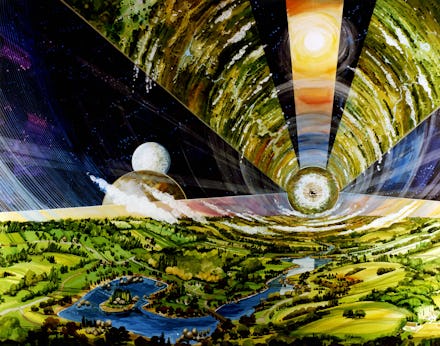Why 7 Experts Are Convinced Alien Life Might Really Exist

It's one of the most profound questions of all time: Are we alone in the universe?
There are some scientists who think we probably aren't.
Of course, we haven't yet discovered any life beyond Earth, but many scientists take the possibility very seriously and are actively looking for it.
This is often a tricky subject for scientists to discuss — remember the "alien megastructure" incident? — because when some people hear the word "alien," it often conjures up images from science fiction like Independence Day or Contact or conspiracy theories about Area 51 and UFOs.
But there's compelling scientific evidence and simple statistics that support the idea that some form of alien life exists. For one, there are billions of other planets in our galaxy and billions of other galaxies in the universe. Surely one of those has life on it — right?
Here are seven scientists who think alien life could exist.
1. Jason Wright
If life arose naturally on Earth, it must be possible for it to arise on other, similar planets, said Wright, a professor of astronomy at Penn State.
"The primary argument is that life exists here, and has existed here for billions of years," Wright said in an email. "That is, life on Earth presumably arose via natural processes, those natural processes are universal and the requirements for life (rocky planets, water, carbon, etc.) appear to be widespread in the galaxy."
"Since it happened here on Earth relatively quickly after the Earth formed and cooled, it must be possible for it to happen elsewhere. Even if the probability of it happening is very low, there are billions of planets in our galaxy alone that should have conditions similar to early Earth, so it stands to reason that some fraction of them also have life."
2. Debra Fischer
Fischer, a professor of astronomy at Yale University, said that on a chemical level, the same thing that happened on Earth should happen elsewhere.
"We are beginning to understand that the earliest life on Earth was a natural consequence — not a freak accident — of early, pre-biotic chemistry," Fischer said in an email to Mic.
"If it is true that life is a common outcome of chemistry, then it is a good bet that this process is happening on other worlds."
"This understanding has emerged from research in biochemistry (for example, by Gerald Joyce at the Scripps Institute), showing that RNA will undergo a process of natural selection and adaptation to the environment much like Darwinian evolution," she said.
"If it is true that life is a common outcome of chemistry, then it is a good bet that this process is happening on other worlds. Now, it's our job to find supporting evidence by searching for biosignatures in the atmospheres of other planets!"
3. Seth Shostak
The Search for Extraterrestrial Intelligence Institute's Shostak thinks that based on the sheer number of planets in the universe, finding alien life is only a matter of time.
"I think we'll find E.T. within two dozen years," Shostak said at a conference in 2014.
Given our current exoplanet searches, we'll have examined about one million star systems by then. "A million might be the right number to find something," Shostak added.
4. Dan Werthimer
Werthimer, director of the SETI Institute, is so sure that aliens exist somewhere that he, along with Shostak, testified to Congress in 2014 that there's "close to a 100% chance."
"It would be bizarre if we are alone," Werthimer said.
5. Chris Impey
Impey, an astronomer at the University of Arizona, says there are three compelling reasons that alien life likely exists.
"The ready availability of carbon, nitrogen, oxygen and water throughout the universe, the large number of habitable planets (10 billion in the Milky Way, inferred by Kepler) and the speed and apparent ease with which life started on the Earth about 3.8 billion years ago" are all indicators, Impey explained in an email.
6. René Heller
"[There's evidence that] life can emerge quickly on a cosmological scale, life might have emerged in most extrasolar systems from a chemical perspective and there are billions of possible extrasolar habitats within our galaxy," Heller, an astronomer at the Max Planck Institute for Solar System Research, said in a phone call.
"From my point of view, it is very likely that some other planets have life as well," Heller said in a phone call. "Whether any of these putative ecosystems was able to breed an intelligent form of life that is interested in interstellar communication, that's beyond what I can assess theoretically."
Heller said the good news is that humans have figured out how to communicate on an interstellar scale. Now we'll have to wait and see if anyone else is listening and broadcasting.
7. Jim Green
Even Green, NASA's director of planetary science, thinks discovering life beyond Earth is a possibility, and he said it's possible we could find it within our own solar system.
During a live TED Talk in November, he said NASA is "following the water" in the solar system to search for signs of life. Water is one of the key ingredients for life as we know it, and NASA wants to visit the wet worlds of Mars, Enceladus, Titan and Europa.
Others, like NASA's Bill Borucki, aren't into speculating. Borucki thinks we need more data and evidence before we can say whether or not life may exist beyond Earth.
"If we want to progress from pro-and-con speculation to knowledge, we should seek evidence of life by launching more advanced space missions that can detect it in our solar system and around other stars," Borucki said on the phone.
To that end, several programs like SETI and Breakthrough Listen are turning an open ear to the universe, waiting for a peep.